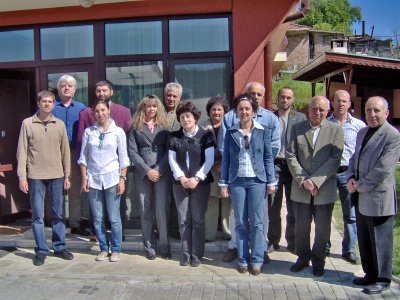Projects: Start, Close, Forgotten?
Date posted
We tend to forget the projects we have worked on too easily. This includes how they may have contributed to change events and processes at local, regional, and/or national levels. We meet with good people that share important insights and lessons, and that we likely will not meet again. As for the shared insights and lessons we can only hope that they leave indelible marks that will guide future work.
In 2009-2010 I worked on the Bulgarian project "Public Support to the Sustainable Management of Natura 2000 Sites Along the Bulgarian Black Sea Coast". It was implemented by the Black Sea NGO Network (BSNN), based in Varna. The project recived funding from the EEA and Norway Grants (EEA and Norway Grants n.d.). I represented CBNRM Networking, a Norwegian NGO, that was a partner on this project.
The focus was on public consultation involving communes, civil society, and ministries, and addressed management of Natura 2000 sites along Bulgaria's coast. It focused on public consultation involving coastal communes, civil society representatives in these communes, as well as relevant ministries located in Sofia. The public consultation took place through two workshops:
- Novo Panicharevo, a village south of Burgas, early in project implementation (9 May 2009), and
- Varna, a final workshop in connection with closure of the project (1 July 2010).
I addressed these issues briefly in my post on Facebook on 8 July 2010. Here I also had occasion to refer to an interview with me in "Factor", a Burgas-based journal, by Rumyana Emanuilidu, who participated in the final workshop on 8 July 2010 (Emanuilidu 2010).
In retrospect, I am not certain which impact the project had, if any, specifically as viewed from the point of view of communes and civil society, as well as on the longer term. I should point out that there is not a specific reason why I focus on this project. I gather that this happens in all sectors, in many projects, and in many countries. In this particular project it was my impression from the beginning that it did not manage to contribute to change through streamlining public consultation around management of Natura 2000 sites. This outcome was less caused by a lacking interest on the part of the local, regional, and national stakeholders, than because the project was badly managed. This critique was implied in the article in Factor.
Lars T Soeftestad
Notes
(1) Adapted from an article published on my personal page on Facebook, 8 July 2010, and reposted 8 July 2016. URL: www.facebook.com/soeftestad.
(2) EEA and Norway Grants. n.d. URL: www.facebook.com/EEANorwayGrants (accessed 8 July 2016.)
(3) The article by Rumyana Emanuilidu appeared in the Burgas-based journal/newspaper Factor (Emanuilidu 2010). As Factor is not published any longer, and the website is not available, I accessed the article through archive.org.
(4) Project photos (copyright Lars Soeftestad): workshop 1: https://www.flickr.com/supras/sets/72157623140291356, and workshop 2: https://www.flickr.com/supras/sets/72157624438067184
(5) Image credit: Lars Soeftestad, Supras Ltd. Yours truly is standing in the back, to the left (Novo Panicharevo, 9 May 2009).
(6) Permalink. URL: https://devblog.no/en/article/projects-start-close-forgotten
(7) This article was published 31 July 2016. It was updated 29 May 2022.
Sources
Black Sea NGO Network. URL: http://www.bsnn.org/
EEA and Norway Grants. n.d. URL: www.facebook.com/EEANorwayGrants (accessed 8 July 2016.)
Emanuilidu, Rumyana. 2010. "Норвежки експерт: „Решете проблема с екологичната катастрофа край Велека" (Norwegian expert: Solve the problem with the ecological disaster in the Veleka region), Factor, 8 July 2010. URL: https://web.archive.org/web/20100711082245/http://www.factor-bs.com/news-15754.html
